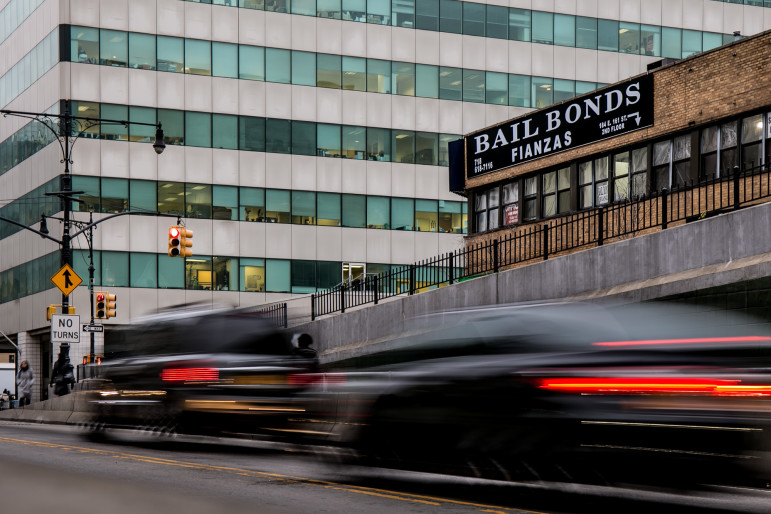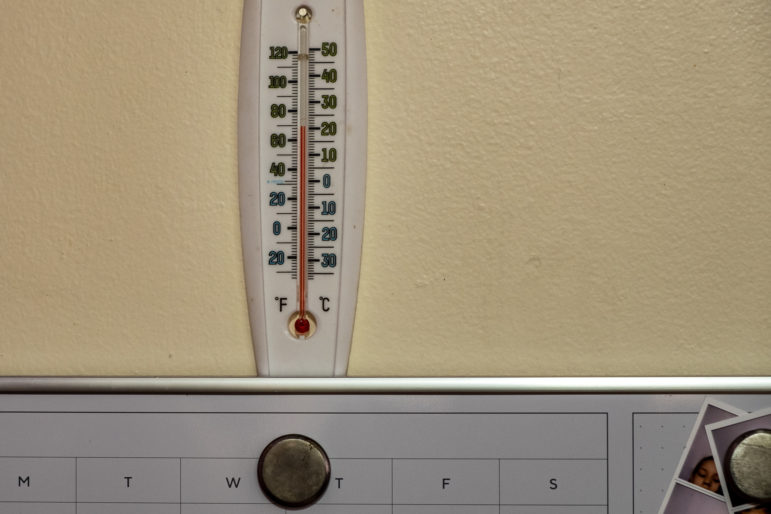
Adi Talwar
A bail business in the Bronx. The bail-review hearings launched in December come eight to 10 days after arraignment. By that time, many defendants are released, and much of the damage from a pre-trial jail stint might already be done.
Last December, New York City courts moved forward with a new initiative aimed at reducing the number of people who are held on Riker’s Island after being charged with minor offenses.
The three-month old program grants defendants accused of some misdemeanors new bail hearings, in front of a different judge, within 10 days of the initial court appearance. The program is one component of former Chief Judge Jonathan Lippman’s longstanding effort to reduce the number of people held on Riker’s Island solely because they couldn’t afford to post even small amounts of bail.
News about the bail-review program initially seemed to spark optimism among some advocates, who have long fought to reform the bail system.
But initial reports from criminal defense attorneys indicate that the measure has yet to make a meaningful difference.
“It’s off to a very, very slow start,” says Tina Luongo, who heads the Legal Aid Society’s Criminal Practice.
“We were at the table at the mayor’s office, and were really, really excited,” adds Scott Hechinger, a senior staff attorney with Brooklyn Defender Services, which represents 45,000 people arrested in Brooklyn every year. “The potential for this was great. In practice, it has been limited.”
Lippman proposed the automatic review hearings last October, after other, more ambitious efforts to reduce the use of bail stalled. In theory, review hearings can benefit defendants by giving their attorneys more time after the initial arraignment to gather information from clients and their families. That kind of information could help flesh out arguments that defendants are connected to their communities, and therefore likely to return to court.
Chief Administrative Judge Lawrence Marks told The New York Law Journal in December that the judges who conduct reviews “will have more time, and at least in some of these cases, more information available to them in making bail determinations.”
He added: “Presumably, this will lead to more people who now might be sitting in jail who pose no risk to anyone being released safely to the community.”
Not all judges were enthusiastic about the proposal. In October, Supreme Court Justice Edward McLaughlin circulated a letter to more than 100 judges criticizing the initiative. He wrote that the plan “insults judges, overlooks that bail review is available presently, fails to provide a complete record of bail/release decisions, and intrudes on the judiciary’s independence.”
As things have played out, however, defense attorneys say the automatic reviews are occurring too long after defendants’ arraignments to have much impact.
Currently, the automatic review hearings don’t take place until at least eight days after defendants’ arrest—and that’s only if defendants agree that the hearings can occur in their absence. If the defendants want to be present for the hearings, they occur at least 10 business days after the initial court appearance. But the critical date for defendants accused of misdemeanors occurs far earlier in the process—five business days after arrest.
On that date, known in courthouse lingo as the “170.70 day,” defendants held on bail in misdemeanor cases are released automatically, unless prosecutors have obtained sworn statements from complainants. If prosecutors have obtained such statements, many defendants plead guilty at the five-day mark in exchange for a short sentence, often amounting to time served.
Hechinger points to an additional reason why the program isn’t having a big effect: The automatic reviews aren’t available when a defendant is initially charged with a felony, but the judge or prosecutor later decides the facts only warrant a misdemeanor charge.
That situation occurs regularly, Hechinger says. Stats compiled by his office show that 28 percent of defendants who are initially charged with a felony, and are not released on their own recognizance at arraignment, see the charges reduced to misdemeanors. Most often, that occurs within one week of the defendants’ initial court appearance, Hechinger says.
Citywide, bail of more than $1 was set in 22,718 misdemeanor cases in 2013, according to the New York City Criminal Justice Agency. Twelve percent of those defendants were able to make bail at arraignment. An additional 12 percent were released on their own recognizance after the arraignment (often because the prosecutor wasn’t ready to move forward at the 170.70 day), while 28 percent made bail at some point after they were arraigned.
Overall, an average of around 100 defendants per week citywide have had hearings under the new, automatic procedure, according to Paul Lewis, a senior official with New York’s Office of Court Administration. No statistics are available on the outcome of those hearings but defense attorneys say that reviewing judges aren’t just rubber stamping prior bail decisions and that they have heard of at least an occasional bail reduction as a result of the reviews.
Lewis says court officials decided to schedule the automatic review hearings after the 170.70 day because they didn’t want to overwhelm the reviewing judge with cases. He adds that while the new program offers defendants a streamlined process to apply for review of bail, defendants always have the option of affirmatively requesting bail-review hearings. The difference is that attorneys often have to take steps to obtain those hearings—like filing a written motion.
Some defense attorneys have long used that existing review procedure to argue that bail is excessive.
Matt Knecht, Supervising Attorney at Neighborhood Defender Service of Harlem, says his office obtains review hearings the same day as arraignment (or on the Monday following a weekend arraignment). Often the office does at least one or two of those hearings a week, he says.
Knecht adds that his office hasn’t represented a single client who has had one of the new automatic review hearings.
Lewis says OCA plans to examine the program this spring, and will consider revisions, including moving up the date of the hearings.
Meanwhile, defense attorneys say they’re still hoping for more far-reaching reform.
“The real conversation,” says Legal Aid’s Luongo, “is do you really need to even set bail in these cases?”








